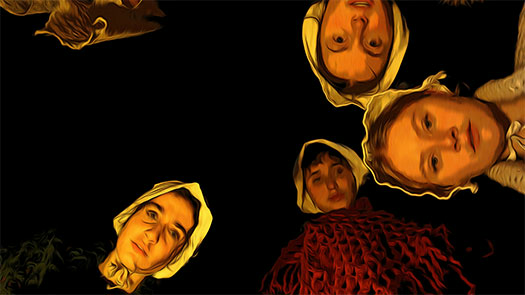Jane Rogers’ adaptation of her own novel, “Mr Wroe’s Virgins”, brings a rather grim but quite interesting aspect of Greater Manchester history to life. This performance was by the Manchester School of Theatre at their own venue.
Chloe Wyn’s set design was a series of 19th century rooms, dark and sparsely furnished, spread out across the stage simultaneously. Candles burning real flames were everywhere, and the unlit spaces showed just how dark interiors were before gas and electricity. Tracey Gibbs’ lighting design put softly luminous shafts of light on featured points, but overall the effect was of stern religious austerity.
In the title role was James Newman as John Wroe: an evangelical preacher who had founded the Christian Israelite Church and was now trying to turn Ashton-under-Lyne into a new Jerusalem. Newman didn’t have a large amount of stage time – the focus of the play was on the women – but he did create a quixotic and quietly intense presence. He was the ruler, but he was unexpectedly relaxed about the women’s chequered pasts; he upheld religion but also debased his position to have as much sex as possible, and to give Newman’s performance credit, he didn’t go into cliché on what are some quite routine practices among cult religious leaders. The story itself is a little well-worn: we have such practices in the modern day, but Mr Wroe himself did have some surprises.
The play opened with a group of young women, described as “virgins”, being awarded to Mr Wroe to run his household and assist him with his religious work. In reality, they were young women unwanted by their families and 1830's society, who just needed somewhere to be dumped. Director Seb Harcombe really had done a thorough job in ensuring every young actor had a different characterisation, right down to the way they moved, and the little bitchy power dynamics between a group of girls thrown together were handled with scrappy energy.
Emily Yendell was radiantly pure and truthful as the genuinely devout Joanna, who wants to found a new church for women only. Pippa Hinds was tough and intelligent as the non-believer Hannah, finding her way to becoming a teacher of night school classes to the local working classes. Lily McClatchey, who would have been a courtesan in a royal court in a different century, pouted her way as the sultrily pretty Leah, running more power plays in the kitchen than anything Versailles could have come up with. Agathi Georgiou limped about as Dinah, a good but dull woman, displaced owing to a lame leg and poor health. (There would have been so many unwanted Dinahs at that time.) Tsen Day-Beaver did a very noteable job as Martha, horribly abused and bruised and speechless when she first arrived, but over time developing into a character that, though having some learning disabilities, could also take care of herself.
Julia Rogers doubled as both Leah’s sister Anne, with sharp shrewdness; and Catherine, a local do-gooder who brought education to the uneducated with earthy kindness. Aaron Shaw was Mr Wroe’s peer Tobias, the face of Victorian patriarchy in his occasional visits to the household; and Shaw gave him full, bluff, Northern entitlement.
While feeling thankful that there has been two hundred years of pushback on lives like this, this reviewer did appreciate dwelling in a piece of local history for the evening.

No comments:
Post a Comment